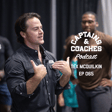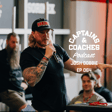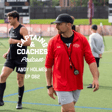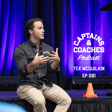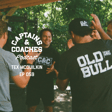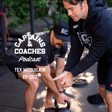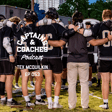Traditional vs. Modern Coaching Dilemma
00:00:00
Speaker
We as coaches are stuck between a rock and a hard place where we've got we've got that old school way of thinking where, hey, suck it up. Hey, you know, we did it this way, so you're going to do it this way.
00:00:14
Speaker
um But the the young athletes don't think that way. and and they speak a totally different language. And our inability or our ability to speak that language is going to be ah paramount in terms of relaying to to these kids what we want.
00:00:30
Speaker
And sometimes, sometimes we do a terrible job of opening that dialogue where, you know, they they don't want to hear some of those stories about us. They don't care.
00:00:41
Speaker
um and so it's our our job is to figure out what pushes their buttons. Welcome to the Captains and Coaches
Podcast Introduction
00:00:48
Speaker
podcast. We explore the art and science of leadership through the lens of athletics and beyond.
00:00:52
Speaker
I'm your host Tex McColkin and today I travel to Tampa, Florida sit down with my friend and mentor, Rafael Ruiz, a master strength and conditioning coach. Raf revolutionized his approach early in his career when he realized that getting athletes stronger in the weight room wasn't translating to better performance on the field.
Rafael Ruiz's Transition in Coaching
00:01:10
Speaker
This led him down a path to understanding movement and accelerated skill acquisition. I first met Raf in 2009, attending a seminar. I would then get the opportunity to lead and coach and teach all over the world, so very grateful for that.
00:01:24
Speaker
And in 2014, I decided to go all in. I reached a ceiling in my collegiate college strength and conditioning coach career, and I had enough of it.
00:01:35
Speaker
but I wanted to understand coaching. I wanted to understand movement and connection with athletes. So reached out to the best in the world. I went down, moved to Tampa and spent four months day in and day out, 5 a.m. m all the way to 8 p.m.
00:01:49
Speaker
with the Ruiz family aiming to understand movement. I am so grateful for that time. There's not a lot that I can say to Raf other than thank you.
Part 1: Career Insights
00:02:00
Speaker
So this conversation, it was so rich. We had a 5.30 a.m. morning workout.
00:02:05
Speaker
Then we sat down for another two and a half hours for this podcast. I decided to split it up into part one and part two. Part one, we dive into Raf's career, the early stages when he went from collegiate athlete into collegiate strength and conditioning coach.
Early Coaching Experiences
00:02:22
Speaker
And from there, all the ideas and questions he started to ask that led to his understanding. We also sprinkle in some experiences early here ah for my time at Tampa. So rich conversation. This is just part one. I don't want to delay it any longer.
00:02:40
Speaker
So now let's hand it off to Raf who helps us raise the game. Ready, ready, and bring. Doing good? Yeah, sure. Lean it back. I feel yeah I got to get a set these. I had to jam it back a little bit because mine was like... I'm recovering in this room after this workout. You'll hear something.
00:02:59
Speaker
right, well, I hope not. the ah Yeah, Luke jokes he puts my podcast on so he can put the kids to sleep. Well, awesome. Just like old times, man, I i love it here in Tampa.
00:03:14
Speaker
Humid, it's just like Houston and DC. I was born in it, I was molded by it. and just Tampa feels like home, and a big part of that is coming to hang out with you and the family. Appreciate that, brother. Appreciate that.
Learning and Adapting in Coaching
00:03:26
Speaker
Yeah. why Dude, I met you in 2009, coming off of collegiate athletics, stepping into the role of college lacrosse coach. Has it been 2009? 2009.
00:03:38
Speaker
And yeah, attended the seminar with you and Jay Welly and then took all of that 16 hours of information. What seminar was that? Number five. Where was it? ah Oakland, California.
00:03:50
Speaker
Gotcha. remember that one. Oh, yeah. We had a star-studded cast there. Absolutely. Freddie C, Wolf. Robbie. That was, I think, the first time i ever hung out with Robbie.
00:04:01
Speaker
Yeah. And Danger Wad, Jesse. Mm-hmm. Yeah. That was a good group. it It was a great group. Man, 40-plus people. And and i've I say this often, that was my first,
00:04:14
Speaker
like step into strength and conditioning. Because before it's like high school football, we're lifting weights. College, lacrosse, we didn't have a weight room. I just lifted because that's all I knew.
00:04:26
Speaker
And then it was like, all right, step into a role of coach. So you're referring to a... first time into a system. yeah Not just let me get into a gym and and and move some weights and what I feel like versus there's a solidified system. Here's what I need to do.
00:04:44
Speaker
and as opposed to what I feel. Yeah. and what Okay. Got it. Which was always bench press. Always bench press. Yeah. A professional performance coach.
00:04:56
Speaker
Then, I mean, it was a great
Professionalism and Preparedness in Coaching
00:04:58
Speaker
time. So it was it was teaching and, I mean, you were you were leading. It was so much speed work back in the the seminar in that day. So it was, I mean, from the ground up literally, because, I mean, we were working with very sagittal, plain fitness individuals.
00:05:13
Speaker
I feel like me and Jesse were the only two, like, field sport athletes in that group. Mm-hmm. Mm-hmm, and it was it was just a very immersive awesome experience that really changed their trajectory of my coaching career and It's always interesting because it's a It's always interesting because it's a You don't know what you don't know until you don't know and and everybody Even now with with social media, you know the common thing is, have you seen your significant other run full speed? Have you been following those?
00:05:48
Speaker
No, but I need that just test. i'm going to That's my first date rule now. Hilarious. It's hilarious.
Athlete Interaction Stories
00:05:54
Speaker
So these people are literally going, honey, run full speed. And they'll just film their husband run across. And then he'll film her. And it's just hysterical laughing because they've never seen. And you you just don't know.
00:06:09
Speaker
what full velocity is. yeah You know, we watch football, we watch baseball, we watch all of this and and in your head, you go, yeah, I can do that. But you can't. You can't unless you adequately prepare for it within a training system.
00:06:24
Speaker
So it's always funny to see that. The, and and I want to go back to yeah the start of your coaching career. So footballer, Sam Houston state, Bear Kratz.
00:06:35
Speaker
And then you stepped into the role of strength, assistance, strength and conditioning coach, Ben Pollard. And I know Benny Wiley was in that coaching crew with you and playing days. yeah So what, what was the click, the moment for you when it was moving away from back squat, back squats and back surgeries to
Injury Prevention and Performance Enhancement
00:06:53
Speaker
now skill acquisition?
00:06:55
Speaker
um It was always interesting to me because Ben was amazing at getting guys really strong. um We had some unbelievable um numbers in the weight room and it wasn't until I got out of playing and took the, the, the coach's eye and to sit there and go be so fired up watching, um athlete X go, wow, you know, 30% increase in bench 30% increase in cleans 30% increase in squats and all of these numbers.
00:07:30
Speaker
And then it not translate onto the field. And as a coach. me personally as a coach, because not all coaches look at it from that same lens.
00:07:41
Speaker
um I felt like I'd failed because in my mind, why are we doing this? Why, why am I asking somebody to invest so much resources?
00:07:53
Speaker
to get these numbers and to put my name on the record board if it's not going to equate to me, what which to me is the most important thing. And that's how you play, how you display skills.
00:08:06
Speaker
And so and that first year was a big eye opener for me. And I had to start to figure out um how do I bridge that gap, me personally.
00:08:17
Speaker
um And that's really what started me on this journey. um That's half of the journey. The other half was um watching my athletes get injured.
00:08:29
Speaker
And that was a huge thing for me um because I've been blessed. I've never had a severe injury. And so seeing guys that that were projected to get drafted, you know, blow out a knee and watching them go from 500-pound back squat to you know, Raph, help me stand up.
00:08:47
Speaker
um And that was a humbling thing. And I wanted to figure out how could I get these guys back to playing speed And then as ah as I would just sit back and watch them move, I noticed, wow, these guys that were injured had certain things, certain certain tendencies, certain habits. And I would say, wow, you know, this guy doesn't have that. And I would look at myself and go, wow, my knees doesn't do that or my foot does do that.
00:09:14
Speaker
And then I started to to kind of just observe. And the more observations I did, the more I noticed these patterns. And I started to say,
Innovative Coaching Challenges
00:09:22
Speaker
hey, Oh, wait a minute. You know, look at Mark. He's, he has that same knee thing that Steven has, but he hasn't blown his knee out yet.
00:09:32
Speaker
And so then I would start to go, you know, I wonder if I can nip this in the bud. And then we started to do that. And then we noticed that a lot of our injury rates started to drop. We started to do much better.
00:09:44
Speaker
um And then in the the weirdest way was the guys started performing better. And it was like, hey, we're not doing any pro short shuttle, but my guys are changing directions quicker.
00:09:59
Speaker
And so in my head, I go, you know we're on to something here. Let's try to figure this out and let's try to develop a system around it. And then how is it presenting these new ideas or questions to the coaching staff that you were working with at the time?
00:10:14
Speaker
um At the time, it wasn't it wasn't as difficult as as I imagine other scenarios could be because Ben was amazing. Coach Pollard was absolutely amazing.
00:10:25
Speaker
um he He took me in his office and said, um you
Effective Communication with Athletes
00:10:30
Speaker
you teach speed really well. And he said, that's yours. And I remember sitting there as 20, 21-year-old like,
00:10:38
Speaker
Oh my God, because at that point in time, we had a couple of guys who who were rated high. And you know, I would be an assistant coach helping guys and i would see these um I would see these scouts from the Vikings and the Green Bay and so on and coming like, hey, how is so-and-so? And they would ask. And then I remember that was my immediate thought.
00:10:58
Speaker
Like that's a lot of pressure to sit there and go, okay, well, you know, John is projected to go in the top, you know, in top four rounds. um Hey, Raf, you got him. know And because I had no experience with draft prep, no experience with any of that, I just knew what was in my head.
00:11:16
Speaker
And it was a perfect world scenario. God bless that. We weren't Alabama, you know, we, we weren't a Texas. We weren't, um, it was a situation that a coach Pollard in any other situation probably wouldn't do that for, for a guy like me.
00:11:33
Speaker
He wouldn't be like, Hey, Chris, take the reins. They're all yours. Um, but being in that situation really allowed me to flourish. It gave me the confidence to do, they were like, Hey, do what you want to do.
00:11:45
Speaker
And, and. I had enough of a conservative balance to say above all else, do no harm. But I also was young enough to say, Hey, let's try it. Let's go do something. Let's figure some new stuff out. Yeah.
00:12:00
Speaker
yeah And similar experience. I went, took the materials that I learned from y'all, brought it back to my D3 team and I was still coaching sport practice.
00:12:11
Speaker
and then leading these sessions, almost volunteering and pulling the guys into the training and learning to communicate what I learned, because that takes reps. Okay, here's how I understand it, but here's an athlete, I need to translate it. And what was beneficial for me was using lacrosse to communicate movement.
00:12:30
Speaker
because they understood that language, but now I almost needed to install a new language. alright So now, what was that process for you of just deciphering, distilling, synthesizing what was in your mind and what you saw into words for these dudes to execute?
00:12:48
Speaker
I will tell you that it comes down to, i never played baseball, but the beautiful part about baseball is it's a game of failure. and and And everybody who's ever played will tell you that no game will humble you more than baseball.
00:13:04
Speaker
um With that being said, I had to make so many mistakes and I wasn't afraid to make those mistakes. So as I'm trying to communicate with these, I will tell you that, yeah,
00:13:19
Speaker
When you're young, you find that one person that goes, wow, they get it, and you jump on that and you go, yeah, you know what, Johnny, great job, great job, great job. um And then you kind of forget that there's 99 others.
00:13:31
Speaker
And so what you what you tend to have is one third of the athletes, you have a clear, direct line of communication. They understand what you're trying to get out of it.
00:13:42
Speaker
and And we have this trust. You have a middle third there that... They might get it, they some might not get it. um And then you have this bottom third that you are speaking a foreign language to.
00:13:56
Speaker
And it's not always sports specific. So in your instance, what you just said is, Hey, my, my one third and two third, I'll speak lacrosse. But what you find is that an early age, a lot of these kids, they might play baseball and this is a baseball training facility, but that's not their love.
00:14:15
Speaker
And so if I go in guns blazing saying, yeah, baseball, baseball, baseball, but the kid loves basketball or the kid loves football or the kid loves boxing or the kid loves swimming, then.
00:14:27
Speaker
then you have to be able to adjust to that. and And I would say as a as a coach who's lived long enough and had enough opportunities, um adjustability is is your prime thing. It's literally just saying, we have this tendency where we have this huge amount of pride in in what we do, and we have this pride in our quality of work.
00:14:49
Speaker
And sometimes what what I always try to relay to Raider is, Everything, it's the yin and the yang. Everything has a positive and and and you you should acknowledge that positive, but you should also acknowledge there's a negative to everything.
00:15:04
Speaker
There's for every for every every team that is really, really fast and we try to develop these fast teams. Well, what you also understand is fast teams are susceptible to the traps, to the counters, to the overspeed to um i I can get somebody to be really competent and overplay and I run a reverse in the other direction. and Next thing you know, I've used your strength against you.
00:15:28
Speaker
So in this instance, I would tell young people is. Is just take a huge step back and ask the athlete if they understand if they don't understand.
00:15:41
Speaker
Oftentimes we get upset, especially if you are a If you are an accomplished athlete, And it's always interesting or an accomplished coach that, why don't you get this?
00:15:54
Speaker
I don't understand why you don't understand this. And we get frustrated, but we never take that veil off and say, hey, look, okay, what are you feeling? What's going on in your head? What are you thinking about?
00:16:07
Speaker
And sometimes that's all it takes just to develop that better relationship, just for them to go, oh, okay, Raf, Raf wants to know. Because sometimes, If I come into a scenario where, hey, this is Raphael, look at all these people that he's trained, look at all the success, well, people go, oh, well, he he knows all this shit.
00:16:28
Speaker
Oh, he thinks he's too good. And then I have to figure out how can I break that down? How can I get somebody to say, hey you know what, Raphael, he's not a bad guy. He may look like an asshole, but he's not a bad dude.
Understanding Athlete Motivation
00:16:41
Speaker
it's one of those situations that sometimes You have to be able to understand the yin and the yang and and and the positive and the negative to everything and be ready to adjust.
00:16:52
Speaker
and here If you don't adjust, you' that there's a whole ah whole slew of half to one third that you will just miss. They just... you're going to lose them and and they're always going to give you their best average effort.
00:17:06
Speaker
Yeah. So. And then sticking with working with the team, I imagine there was still drills and scenarios and then, which we're going to get into next, when you worked into the professional level, you were almost asked to do things as a coach that you knew philosophically you didn't necessarily believe in.
00:17:25
Speaker
but it's what head honcho wanted to do. So then what was your approach there? Was it still that do no harm? Again, great scenario because the quote unquote opposing, and again, I was young, but I knew my place.
00:17:43
Speaker
So I knew walking into a situation with the Bucks that I was not the head guy. And I knew my place and my place was to read a workout card and to set weights.
00:17:55
Speaker
And so I made it my job to be the very best at that. I wasn't going to ruffle any feathers. I'm going to learn what you're doing. um If I take that with me or what I take and how much of that I take with me, that's a different story.
00:18:13
Speaker
But what I'm not going to do is not be well versed in your training system when all is said and done. um And The beautiful part about what we do as strength and conditioning coaches is you you become you become this counselor, you become this ear.
00:18:31
Speaker
And the moment that that happened, all of a sudden they go, oh, Raf, what are you doing? Oh, well, this is what I do. Oh, well, tell me more. Teach me more. Where do you do this at? And next thing you know, it became, you know, one guy, hey, I'll meet you at your place. so Hey, I'll meet you. and And it was never, I never tried to poach anybody. I never tried to go, Hey, you know, this is stupid. I never bad mouth, um, any training system.
00:18:56
Speaker
But what I tried to do is to literally make myself, um, invaluable within that system, whatever it is. So I was the one who was always there. I would show up first. I would beat him there. I would, I would finagle security, get there and I would sweep the gym.
00:19:12
Speaker
And all of a sudden, you know, my boss would show up and he'd be like, oh, great job. And I wanted to make I would, and I made it my job to make it impossible for him to not hire me.
00:19:23
Speaker
That was literally my, my focus was when all a sudden done regardless of whether I had intention of staying there or not, my focus 100% was I'm going to make it impossible for you to not hire me.
00:19:36
Speaker
Yeah, and then that highlights one of the key things i want to get into, which is professionalism. Time out. Let's take a second to talk about the Old Bull training program. This is an online strength and conditioning program that I'm writing for myself and handing to you.
00:19:52
Speaker
I'm a former collegiate athlete, strength and conditioning guinea pig for the last 15 years. I'm feeling every game, I'm feeling every training session and exploratory work. that I've been through. Now I take all those lessons and the feeling and the pressure and the corrections and then I hand it off to you. What I love most about the program and highly encourage people to do is film their lifts, post it into the feed, and then we give them fast feedback to help them correct those lifts. Why I love that, everyone else gets to see those lifts, they see the coaching cues, and they're starting to learn and develop their own coordination
00:20:27
Speaker
and maybe seeing something that someone else is doing that they can feel for. That's the beauty of this program. It's constantly evolving and we're we're having fun there. That's the also also the thing. We're having fun. There's great leaderboard and people are finding others to compete with.
00:20:44
Speaker
I love the program. I'm out there doing it with you. And i encourage you to train with me, not for me. For a free trial, seven days, click the link in the show notes, try the Old Bull Program. And now, back to the show. Ready, ready, and break. When was the moment where you just turned pro as a coach, where you identified and had pride in the sense that i am a coach?
00:21:09
Speaker
I don't know if there's any one single time. um Again, from a positive and negative standpoint, I always felt like I didn't ball.
00:21:20
Speaker
I always had an inferior complex when it came to, if ah if an athlete asked me a question that I didn't know, that bothered the crap out of me. It really just to my core.
00:21:34
Speaker
um But I was humble enough to say, I don't know, but I'm gonna figure it out. And so I always just go, okay, figure out, figure it out. um i I don't know if I was ever, i don't know if I am, even even today in 2025 with the amazing things that I've been blessed with to this day. I don't, I could walk into any scenario and be like, God, I really don't belong here.
00:21:58
Speaker
Like this, this doesn't, and you I don't deserve this opportunity to work with whatever. Um, but I always ask myself, okay, so well then idiot get prepared, like learn, like, let's figure this out.
00:22:15
Speaker
There were a couple of moments at at Tampa where there were a couple of big interviews where I would get mic'd up for some big networks that were showcasing the athletes.
00:22:27
Speaker
um At that point, I was like, oh crap, this is serious. Like, this is kind of a big deal. um Our first big fight with Tarver was a huge deal because I didn't grow up in the boxing world. i grew up I grew up with martial arts, but I'd never... My first foray into that into that was the moment that we did the rematch for Roy Jones-Tarver.
00:23:00
Speaker
And I watched the first one. And I grew up as a Roy Jones fan through the 90s. That was, I mean, that is a bad man. And I remember Tarver's agent calling me and and I didn't know anything about it, but it's Al Heyman.
00:23:17
Speaker
ah as As I grew into the sport, Al Heyman is... the man when it comes to entertainment. He is the who's who. He is the wizard of Oz behind the curtain of all of celebrities.
00:23:31
Speaker
um But I didn't know that. And so I remember when he had called and then he flew down and met me and we sat there talked and he goes, okay, this is the scenario. He goes, um, after meeting, he goes, let me talk to my client. Let me talk to my client. Let me talk to my client. And after finally we sat there and he goes, all right, he goes, if, if this is what we want to do, we need you to get Antonio Tarber ready to fight Roy Jones. And I remember sitting there like, what?
00:24:02
Speaker
How much time? Yeah. I mean, it was serious. And I was like, because I'm a Roy fan. And that's a weird, that's like a weird, in my mind, getting him ready, the whole time getting him ready for that fight, in my head, he's going to get knocked down.
00:24:22
Speaker
in my head, like, God, this is going to be terrible. This is goingnna be terrible. But it didn't stop me from trying to do a better job, make it the worst, take it a worse scenario. and And maybe he's not going to get knocked out.
00:24:35
Speaker
Maybe he's just going to get beat up pretty bad. Okay. Maybe he's not going to get beat up. Maybe he's going to go to a decision. So it was always trying to fight for a better position, fight for a better position. And I remember we We do the whole camp.
00:24:49
Speaker
I mean, we do the whole um prep work up to it. And then he goes, OK, we're going to fight camp. This is we're going to go to Vegas for four weeks. So we go to Vegas. We check into the hotel. And I remember getting him ready. and And it's it's gut wrenching to take somebody from 230 to 175.
00:25:11
Speaker
Like that is a scary, scary moment for for anybody. Anybody in wrestling understands that. But to take wrestling and then to say, because I made the mistake of saying, ha ha ha, what happens if he doesn't make weight?
00:25:29
Speaker
And they go, well, we'll probably get sued for $20 million. dollars And I was just like,
00:25:36
Speaker
And so I remember that last day and we're, we're creeping. It's like 185 and then it's like 182 and then it's like 180 and we're like right there. And I'm just like, and and the last little bit is struggling to come off.
00:25:52
Speaker
And I remember just like, God, this is not going to happen. And, um, but Before the weigh-in, you know, we we've done out we've done all our due diligence, and we put him in a sweatsuit, and we put him in the sauna, um and I have him just doing some light step-ups and light jogging, and it's... I mean, he looks dead.
00:26:11
Speaker
Like, I mean, from 2.30 all the way down to 1.70, and I'm sitting there like, please don't die. Like, don't die. And then finally he comes out, we have our own scale. We put the scale down, towel them off and it says 175, but it's not an official scale.
00:26:29
Speaker
So we don't know, but I'm like, okay. So we go upstairs and, um All I know is he's going to get on a scale. and And if it says 175, the fight is on.
00:26:42
Speaker
If it doesn't, then they give you two hours and then you can try to get more off. And if it doesn't, the fight's off. Then then there're the belts, none of that, all of that is off. And so we go up there. Well, they're telling us where to go and they go, okay, go to this this ballroom.
00:27:00
Speaker
So they open the door to the ballroom. There's probably a thousand people in there. and there's a big stage up there and I could see the scale and I'm like, this is for the whole world to see. I mean, this weigh-in is televised.
00:27:18
Speaker
I've never, because in football, you do your job and then you're like, hey, good game guys, go get it. yeah In any other sport, but in boxing, it I mean, you were, i mean, it's Tarver and then me, I mean, you're right there with him.
00:27:33
Speaker
And I remember walking up and my heart is racing. I mean, it's just racing. And then there's like this big, they're like, oh, well, we're not ready yet. So we're going to do him last. and but And so then there's arguing and I'm like, he's getting on the scale right now because I need to get him rehydrated. We got we gotta to get going.
00:27:53
Speaker
And so after all this hoo-bub-bub, and then finally they go, okay, let's go. And then they, you know, they strip down and they get on there. And it's just me and Tarver on this stage. And then the um then the fight judge, or the representative from from the belt.
00:28:09
Speaker
And so they look and then it ended up being 175. And i remember just like... Oh, yeah, I was in that my job was over after that. It's really over, um so to speak.
00:28:21
Speaker
And then it shifts to damage control. in in Like, yeah, let's go. Let's get some. So immediately already had already had a water bottle that's got my hydration stuff in it.
00:28:32
Speaker
um And I've got some aminos that I literally we get them before he even gets dressed. I'm like, start drinking this, take these. and then um And then we'd go to the the restaurant and we'd start filling up. Now they have new rules that you can only be, depending on what organization, but they can only be, say, within, they they agree prior to. It's like the when you do the day of the fight, because this is the day ah ah before the fight, you can only go up by 10 pounds.
00:29:01
Speaker
Oh, okay. Stuff like that. um So the the bigger organizations will say, if he weighs in at 175, on Friday, Saturday night, he can't be more than 185 kind of thing.
00:29:13
Speaker
um But I will tell you, it was interesting through the rest of the career because we really did a great job fine tuning it. He built a lot more lean body weight.
00:29:26
Speaker
um He would get bigger. and bigger and bigger. So by the time he was filming Rocky, he would, I mean, he was blown up. Mason Lyne-Dixon. Yeah. And then he was like, hey, Raf, I got to fight at 175. I was like, oh God.
00:29:40
Speaker
um But we did a much better job of getting to the, um even to the point by by the time that he had retired, we were getting down into like the 173.
00:29:54
Speaker
and feeling great. It wasn't, he didn't look emaciated, he didn't look drawn. um It was ah it was it was a little bit better science by that point. Yeah.
00:30:06
Speaker
ah some interesting non-science experience with Tarver when he came to train when we were I was with you at Tampa. the ah The first one, you would always pair me with him, which I always thought was hilarious, because how how tall is he? six two six two Yeah.
00:30:23
Speaker
And so it's like, all right, well, I got this professional athlete. I'm responsible for everything. And when we're matching up. We're not matching up. So I'm getting extra calf raises in on all the extra stuff. And then we were doing...
00:30:35
Speaker
armadillos, something on the ground and ab work. And then just, he's wearing just basketball shorts with pockets, $5,000 cash, just falls out of his basketball shorts.
00:30:48
Speaker
And I'm looking at the cash. Did that match yours? Oh, I didn't have 5,000. I'm looking at the the the open bay doors, looking at the cash and thinking, all right, Who's faster, me or Raf?
00:31:00
Speaker
So ah just just hilarious. So then it's like, excuse me, sir, you drop this and just hand him this change. And then the any time he'd come in and like take a minute to breathe and you needed him going,
00:31:16
Speaker
Just put up the phone and start walking him through the, you know, the, the dizzy lunge or the IT tb band slow twisting kick. And you weren't even recording. It's just like, oh, camera's on.
00:31:28
Speaker
Dialed in and then he was just moving. Because that's what you learn about him. yeah That's what you learn sometimes, guys. You know, he is showtime. He is, that is why he does what he does.
00:31:39
Speaker
And in in that instance, I learned pretty quickly that, um, He is very well-spoken and he really practiced that. He prides himself of of of his image when when other people are looking. And I thought to myself, you know what?
00:31:56
Speaker
let's Let's put this out there. Let's use this as a tool. And it works. It works great. um Then I started to learn just leave it rolling. So I would just film and and not not hit stop, not hit stop, because he'd be like, oh, dude, let me see that.
00:32:13
Speaker
And then one time I got caught, I was like, oh, I'd be like, dang it. was It wasn't real. Storage, huh? Yeah, I lost my storage. Oh, dude, it's fuzzy. um But then I learned just boom, and then I would play it back and...
00:32:26
Speaker
whatever it was that he did, but it is sometimes you learn what pushes different people's buttons. And I think that's that's really um an intuitive coach will start to do that. I've had athletes.
00:32:40
Speaker
It's always interesting you talk about the yin and the yang. I've had athletes that have yelled at me because where you almost do that coaching baby talk.
00:32:53
Speaker
Like, hey, great job. Hey, you're doing great. Hey, oh, it's okay. Don't worry about it. Well, I've had athletes. I've had an athlete who was was an All-American setter, and she turned around, and she goes, Ralph, don't blow smoke up my ass.
00:33:06
Speaker
She goes, if I'm not doing right, you tell me. And I was like, okay, let's do it. And... And I could have continued down that road, but I would have lost that athlete.
00:33:19
Speaker
And now all of a sudden she put it out there and it was like, you know what? 100%, you're absolutely right. let's Let's make sure that we're... And some people can't do that. Some people, because of the the age that we are in we We as coaches are stuck between a rock and a hard place where we've got we've got that old school way of thinking where, hey, suck it up.
00:33:43
Speaker
Hey, you know, we did it this way, so you're going to do it this way. um But the the young athletes don't think that way.
Modern Coaching Connections
00:33:51
Speaker
and And they speak a totally different language.
00:33:55
Speaker
And our inability or our ability to speak that language is going to be ah paramount in terms of relaying to to these kids what we want. And sometimes sometimes we do a terrible job of opening that dialogue where you know they they don't want to hear some of those stories about us. They don't care.
00:34:15
Speaker
um And so it's our our job is to figure out what pushes their buttons. Time out. Coach, are you banging your head against the wall trying to motivate athletes who seem mentally soft?
00:34:27
Speaker
You're yelling, they're shutting down. You're punishing, they're checking out. Sound familiar? Here's the thing. The game has changed, but most of the coaching education hasn't caught up yet. They're locked in on teaching programming and not people-ing.
00:34:41
Speaker
In my new course, Why They're Not Listening, Coaching Today's Athlete, you'll learn how to connect with your team and transform disconnected players into captains who perform under pressure. Stop fighting your athletes and start developing them. Go to listen.captainsandcoaches.com to enroll.
00:35:00
Speaker
That's listen.captainsandcoaches.com. Transform your coaching today. Now, back to the show. Ready, ready,
Urgency and Leadership Development
00:35:07
Speaker
and break. A big theme that I took away in the sense that the the different age groups that we were working with, different skill levels from Olympians, professional boxers, down to middle school kids.
00:35:20
Speaker
And the the big theme that I loved was creating a sense of urgency. meaning we have 60 minutes, we have 90 minutes in this session. When I ask you to move, you got to move.
00:35:32
Speaker
And that but it it was came at an interesting time because we were so involved with the CrossFit community. I was traveling the world coaching, coaches that were in CrossFit scenarios, how to then coach athletes.
00:35:46
Speaker
And then what I really struggled with was, okay, yes, there's perceived effort, then there's measurable intensity, but then when you described urgency of your expectation, when we move, we move.
00:36:00
Speaker
it's not holding anything back. Correct. So that that really was a ah light bulb moment in aiming to take it in. So with within the theme of urgency, where where was the origin of that word and in your communication to then just be a theme throughout, no matter if for're working with an Olympian or ah kid just getting into training?
00:36:20
Speaker
It all depends because What I've started to learn over the years, and it's really accentuated over the past 13 years for for obvious reasons, my son, but The sense of urgency is completely different for for for a kid.
00:36:38
Speaker
So from Zia's age, six, to to right now, Raider's age, Raider's coming out of what we call that very first stage one. that That is really just a, can I build up enough tolerance to discomfort so that they can listen to me?
00:36:56
Speaker
And that's a different sense of urgency. That is a sense of urgency that really has everything to do with rules. um I need you to move fast enough where you don't get yelled at.
00:37:08
Speaker
and And that's not a bad thing because that's how a kid operates. Everything is off of negative reinforcement. yeah That's kind of what we do. It's as a kid, everything is no, no, no, no. Don't do this. Don't do that.
00:37:21
Speaker
um Don't do this because you're going to get yelled at. Well, that's just the way that they're raised. Even me as a coach, I have to deal with the fact that that's how their parents raised them. Is it right? Is it wrong?
00:37:33
Speaker
who Who knows? But it is the reality of that is how that kid speaks. And so right now, the sense of urgency is I need to do just enough where I don't draw negative attention to myself I don't get yelled at.
00:37:49
Speaker
um At that point, then they start to get to where, hey, now the sense of urgency. For the longest time, we I made the mistake of trying to drive being a teammate into Raider.
00:38:03
Speaker
And that's a foreign concept to young people. They just don't understand that yet. um They haven't suffered together. um him and his teammates, the as a as a team, they don't do team strength and conditioning.
00:38:19
Speaker
um and And I say that as they have it they haven't learned to suffer together yet. So until you learn to systematically suffer together, your sense of teammateship doesn't mean anything.
00:38:37
Speaker
It just, it's a, might as well speak a foreign language to him. Now Raider is at a point where he's starting to understand that. And so we shift that sense of urgency to things like team totals.
00:38:50
Speaker
And so now as I introduce or I introduce him prior to, but it had no effect on it. Now, as I, on a fun Friday, I'll say, okay, we have team totals. And so yeah if we say we have 30 reps between you and I and you do five, well, now Raider starts to understand, oh, crap, I just dumped 15 reps onto my teammate or whatever the case may be is.
00:39:17
Speaker
um And he now has empathy for that. He understands that. So now that sense of urgency is no longer... hey, I'm not gonna get yelled at um by my coach.
00:39:30
Speaker
um I might get yelled at by my teammate. My teammate might rip my head off. And so now it becomes more of an empathy towards towards one another as teammates versus right now, prior to that, everything is, oh, wow, look at so-and-so getting yelled at. Ha-ha-ha-ha.
00:39:47
Speaker
But now it's at a point where, hey, hey, Raf, you know what? If you present your glove earlier, then maybe you'll feel that and you won't get yelled at. Hey, thanks, Rayger, I appreciate that.
00:40:00
Speaker
And so that's where he is. So that sense of urgency now becomes a team sense of urgency because he knows that yeah If Chris doesn't get yelled at, then I don't have to put on my track shoes and run foul poles.
00:40:15
Speaker
Yeah. And so that urgency takes on a whole different meaning. And then eventually when they start to develop some really high level stuff, Raider doesn't understand anything about.
00:40:29
Speaker
And when I say nothing, um, money. So now all of a sudden when a kid, a 24 year old kid is up for contract renegotiation, there's a whole different sense of urgency that nobody else can really touch prior to that.
00:40:48
Speaker
And so when we talk about leveling up that urgency It's, it's, it's, it's do because.
00:40:57
Speaker
and then trying to get them to transition and do amazing with that and earn and a and then eventually get into that next phase and then get into that next phase mean it's and it's it's hard to do because There's so much overlap, there's so much difference between, i mean, from the 13-year-old that Raider is, this is the same as the 13-year-old that another kid is there. It's a completely different world for a lot of these guys.
00:41:24
Speaker
Yeah. and One thing i still coach middle school and high school lacrosse. So I want to stay in the trenches to understand the kid. So when I'm teaching lessons and communicating, it comes from real life examples.
00:41:38
Speaker
So I took a lot of notes this past season coaching at a private school and I was listing these these culture killers and seeing envy, right? Because there's there's different socioeconomics at the schools.
00:41:50
Speaker
So nice cars versus the hand-me-down cars. So envy, resentment for playing time and all these different things. But then the the biggest, and it, I mean, it took me a whole season to just really head scratch and come to the conclusion that there was a sense of entitlement to where the best guys on the team, they chose not to attend practice because they felt they weren't getting better at practice because they were the best guys on the team.
00:42:19
Speaker
So that that just way of thinking, it it blew my mind because I had yeah i'd never thought that ever. So it was lift up if I was the best, which I never was, but if I was the best person aimed to lift up so that we can go win a game.
00:42:33
Speaker
So now... And in working with such wide age ranges and levels from the tip of the spear all the way to, i mean, two year olds running around and observing some stuff, like these natural human tendencies that are almost represented and taught through biblical texts to protect us from, how do you feel the sense of,
00:42:57
Speaker
ah the weight room, training together, or a good leader and coach can help almost prepare for these inevitable ah culture killers that come up.
00:43:10
Speaker
What's really interesting that I've learned with young athletes is I've learned, and I'm not saying it's wrong on any standpoint,
00:43:22
Speaker
But there is inevitable natural hierarchy of development that sometimes we as coaches try to quench. And to me, for instance, sometimes Raider is mean.
00:43:40
Speaker
Sometimes he's an asshole to his teammates. I can't quench that fire because right now he's at a point where he's trying to learn self-identity. And so...
00:43:52
Speaker
Do I want Rader to be overly nice and pretend to like somebody? Or do I want him, if you feel like you want to be an asshole, be an asshole and now he doesn't like you, you've lost a friend?
00:44:07
Speaker
Lesson learned. And so I always catch myself trying to let the natural course take its toll.
00:44:18
Speaker
um In addition to that, what I try to do is if I see something again, if there is a positive and negative to everything, say say you really, really want a car that somebody has or you are just like, wow, so-and-so's got a nice BMW.
00:44:38
Speaker
Would it be better for me to say, hey, Raider don't want that or hey, let's sit down, let's figure out how you can get your own BMW.
00:44:51
Speaker
I found myself at a young age being quick to say, hey, don't don't don't act like that versus, okay, I see how you feel.
00:45:02
Speaker
Now, how much do you think that car costs? Oh, okay. So how much do you think that you have to make to earn that car for yourself? Okay.
00:45:12
Speaker
Well, if you go this this, this, this, you'll put yourself in position to do that. And what I found is if I can get in and do I, do I think that it sticks every single time? Absolutely not.
00:45:26
Speaker
Absolutely not. But it doesn't stop me from trying. and And I think that's the hard part for me as a coach and as a parent is sometimes if it doesn't work one time, then we just abandon it.
00:45:40
Speaker
And I'm like, you know what? Keep going. Keep trying. Keep trying. And so in that regards, my culture killers, what I try to do is figure out, okay, if somebody is super high super hyperactive and they're not paying attention and they're disrupting my team, well, then I'll change the drill and I'll make them I will make them my demo person. And all of a sudden they go, oh, okay.
00:46:07
Speaker
Okay. What do you want me to do And next thing you know, instead of ripping their head off, instead of saying, okay, everybody fine, go run foul poles. Now I've, I've tried to get this athlete to buy in. I've turned their strength into something that was, was a distraction. And now it's become something that now the team can go, oh, hey great job, Johnny.
00:46:26
Speaker
And next thing you know, we've we've kind of flipped the script and allowed that athlete to flourish better than immediately going, don't do that. Yeah. Eyes on me. I need you to steer over here.
00:46:37
Speaker
well Maybe that's their way of learning. Maybe that's the way that their natural nervous tick happens. I mean, we had a girl out there, she was nervous as all get out and you could read it and doing everything I can to just set her mind at ease because this is her day one and all she's heard is how hard Raph is.
00:46:59
Speaker
And so I can tell that every single moment she's waiting for Raph to tell her to do something that is just awful. Like, oh, this is it. Oh, here it comes.
00:47:10
Speaker
Oh, here it comes. Calm down. We're not doing anything difficult today. you We're just gonna work on teaching. And so just breaking down those walls for her. So the culture killers,
00:47:22
Speaker
I try to flip the script. I try to turn it around and figure out, okay, you're jealous of this. Well, you know what? let's but Let's use that jealousy for, okay, Chris, you're gonna take a water break because you did so awesome at that last set.
00:47:39
Speaker
Well, I wanna take a water break too. Okay, well, you can. Show me this set. And next thing you know, they do that set and it's a win-win versus just being jealous and trying to tell somebody not to quote unquote, covet something else. Okay, covet it, but let's figure out how we can train smarter and work towards doing what you want.
00:47:59
Speaker
Time out. Tex here at Train Heroic headquarters meeting with the team to talk about the coaching experience that I'm able to provide for my athletes. So if you're a coach and want to put your program out there on an app that athletes actually enjoy using, Train Heroics for you. I've been using it since 2014.
00:48:18
Speaker
delivering literally over tens of thousands of workouts to athletes, and Train Heroic allows me to provide the unique coaching experience that I want to. Uploading video, providing coaching feedback, directions, and building a community, that's why I love Train Heroic.
00:48:33
Speaker
And if you want to take your athletes where they can't take themselves, that they want to go, head to trainheroic.com slash captains and check out how you can deliver programming to them.
00:48:44
Speaker
And now, back to the show. Ready, ready, and written.
00:48:49
Speaker
Yeah, I like that shuffling and and mixing behaviors. And again, thinking through this stuff, I then took a note from the book way back from 2014, or you refer to as calculated coaching.
00:49:02
Speaker
And there was a there was a day our group wasn't feeling it. And I was included in this. And you're like, Okay, let's go outside. and neglected all the warm-up, the prudency, right? The build. And it's like, no, you're not valuing my time.
00:49:17
Speaker
And then you ran it. You just dead sprinted us. So then with that mindset of calculated coaching and like I have phased development over season in our dynamic warm-up instead the same routine every 10 minutes, every practice.
00:49:32
Speaker
All right, four weeks we're here, four weeks we're here. Then three weeks we're ready to go. We've developed athleticism. improved it, and you didn't even know it. It's just 10 minutes. And it keeps their head in involved. and So the value was was not there. Certain individuals, especially senioritis, is kicking in, and the rest of their kids that are not playing, their friends that are not playing a spring sport,
00:49:54
Speaker
And then now they're asked to do this difficult thing, difficult in in their mind. And then it's like, all right, so mixed it up and we started the practice with stick work.
00:50:05
Speaker
So it's it's simple stick work. We're moving, we're shaking, we're getting our chilly hot, our heart rates up and we're sweating. And then now we're going to do 10 minutes since we're already warmed up, we're going to do 10 minutes of ah training.
00:50:19
Speaker
So instead of gradually ramping up the movements and the progressions, it's, the you're ready. Let's get after it. So, okay, you didn't value my 10 minutes here. Well, I'm going to show you a different side where this is this is the strength and conditioning coach that's stepping in. So aiming to mix it up and help them just have build perspective of...
00:50:41
Speaker
Like there's there's different shades that I can apply to this. I'm not always the, ah you know, apathetic, happy go lucky, progressive, let's fail fast.
00:50:52
Speaker
And then it's okay. You you want to be hard. ah You want a hard ass coach. I got the gear and we're going to kick it into it. So different tools and framing it as calculated coaching from ah the perspective way back when and There was always breakthroughs that I felt, and then you saw similar ah behaviors and patterns step in.
00:51:14
Speaker
So it was like, all right, well, these lessons take time. It's not a one and done thing, especially when it comes to ah confidence, behavior, stepping up and saying something, acting like a captain would, in my perspective, on my mind.
00:51:29
Speaker
um So ah a lot of growth, even though the the games weren't there, it was it was a great year for me, but a lot of tools just reflecting and the remembering and like, all right, let's let's aim to grow from this versus get frustrated and internalize it myself.
00:51:45
Speaker
Well, the interesting part is
00:51:49
Speaker
coaches by nature are control freaks. That's just what we do. We try to control all the variables. And we are the first person to fail when it comes to preparing.
00:52:02
Speaker
It was really interesting. I was talking to a couple of coaches and a couple of scouts, and they... From the outside, I look like a helicopter parent because I'm filming Raider, I'm telling Raider what to do things like that as a young person.
00:52:21
Speaker
So, I mean, he's seven years old and I'm like, hey, do this, you gotta do that. Hey, eight years old, you gotta do this. Well, that's how people know me. But what they have have now, because I'm already labeled as a helicopter parent.
00:52:34
Speaker
and When I was talking to a couple of these coaches, they were like, yeah, you know, so-and-so said that you're their you know favorite helicopter parent. And I said, I'm not a helicopter parent. That's a mistake. I said, I'm an Eagle parent. And this is a self-applied term. And they go, well, what do you mean by that?
00:52:52
Speaker
And I said, my job is to teach Raider how to soar on his own. And they go. Oh, I said, everything that I do, I'm trying to get, promote my athletes to make better decisions.
00:53:08
Speaker
We as control freaks are so quick to say, do this, no, don't do that, do this. Well, we have to let them make that choice. We have to let them fail.
00:53:18
Speaker
We have to let them not warm up correctly so that they understand crap. I just drew the ire of my coach. I did that. Nobody told me not to warm up.
00:53:30
Speaker
Nobody told me not to play grab ass. Nobody told me not to be on time. I made those decisions. And so as a coach, as a parent, my job is to make sure that they understand that because if they don't, the natural human mind says, rap is an asshole.
00:53:49
Speaker
I'm not an asshole. I'm only playing the game that you chose to play. You walked in these doors. My job is to help you move better. My job is to make you a better athlete.
00:54:01
Speaker
You made the decision to walk through those doors, lacking intent, lacking purpose, lacking a sense of urgency to develop and to chase your dream.
00:54:12
Speaker
And if you do that, you are making the choice to bring out the worst of your coach.
Creating Positive Culture and Feedback Loops
00:54:17
Speaker
And, and Raider is in a perfect scenario where I say, listen, Raider, I have technical knowledge.
00:54:26
Speaker
I can be the coach who coaches you technically. Hey, turn your foot a little bit this way and we'll get more power here. Turn your knee this way, we'll get more speed. But if you don't want that, if you want to draw the ire of your coach, then then that is your choice.
00:54:43
Speaker
and And when I put it that way, he starts to make better choices. He starts to do things like, oh, well, um you know, my dad is going to take me to practice, so let me make this easier. Let me wash the dishes.
00:54:56
Speaker
And I'm like, great job, kid. You know what? Your mom is going to take you to your game this weekend, and you decide to go cut the grass because you want to make it easier on her. Like, to me, when I look at things like that,
00:55:09
Speaker
then I know we're doing the right thing because he's making that initiative. We talk about initiative all the time and it's such a fleeting thing.
00:55:19
Speaker
We as coaches and parents need to understand there's a huge difference between um a good friend of mine is a downrange dog trainer. And he said, I remember when, when I got Kino, he goes, do you want Kino to be well-behaved or do you want him to be obedient?
00:55:38
Speaker
I said, what's the difference? He goes, obedient, he'll he'll do what you want him to do. He might do some other shit that you don't like. And if that's a pit bull, that's a bad scenario.
00:55:50
Speaker
Or do you want him, the most of the time, do the right thing? I go, do the right thing? He goes, you want a well-behaved, you want Kino to make choices on his own. And that stuck with me.
00:56:02
Speaker
That stuck with me as as as a dog dad, and then that stuck with me as as a coach. I said, you know what? I don't need Raider to be obedient. I don't need him to sit there and sit when I tell him to sit.
00:56:14
Speaker
I need him to go, okay, I should sit now because of this, this, and this. And that's the way I coach. I want my athletes to start to understand, hey, when you turn your knee in, it'll help this And then all of a sudden, a guy like Jack is super smart and he'll go, oh, okay.
00:56:32
Speaker
And then I can i can see that the gears turning, goes, oh, well, when I'm loading, I get, yeah. I go, that's exactly right. And that's kind of what I want on lead that.
00:56:43
Speaker
Yeah, ah that was a cool moment observing the session is when you were giving him the technical cues and then he brought it back to his swing. You didn't say, hey, when you're swinging,
00:56:56
Speaker
he was able to internalize that and then apply it to his performance. Absolutely. Absolutely. And he'll go, oh, well, I noticed towards the end, so the conversation that you and I and Andrew had was, he says that um he had a lot of trouble with his hip flying open.
00:57:14
Speaker
And so he would compensate by, he goes, that if you saw that weird stance that he did where he was like way closed off, he goes, I do that because I can't turn my knee in on the back half of the season.
00:57:26
Speaker
And I was just like, I go, did you get beat a lot? And he goes, yeah. I go, well, let's try to fix this. if we can If we can do this, this, and this, it'll give you a more 50-50 balance stance.
00:57:38
Speaker
And now all of a sudden you're not closing it off just to try to get a little bit of internal rotation. And he's like, yeah. yeah And so then from that point on, the rest of the workout was, oh, okay, Raf, is it doing it? Because I i don't feel like it is.
00:57:53
Speaker
And then he would kind of fix it and do it. And you know, okay, I'm in, I got it. So I thought that was a really cool thing for him to be able to go through. Yeah. and And then now led led him to that. Led him to it.
00:58:05
Speaker
The I do want to reflect on that 2014 because we had an opportunity. Northeast High School. Coach Jeremy, you got asked a favor.
00:58:17
Speaker
And know to close the podcast, I'm going to give a little day in the life of my experience with you. But there was this brief moment in time where we had afternoons off. And there was this gap.
00:58:29
Speaker
And then you were asked a favor, then you asked a favor your staff. And it's like, all right, we can't not do this. These kids need it. ah And we we stepped up and I ah can't remember how long it was, whether four, six or eight weeks leading up to their spring ball.
00:58:46
Speaker
And I mean, it was a great experience that i I'm glad I had the energy. I couldn't do it now, but glad I had the energy. But the the kids, I mean, they they truly needed it. remember showing up day one, they were in sprinting in socks on the field because they didn't have shoes. We were in the weight room and the, forgive me, the ah the people under the stairs, under the freaking, ah the stands, it was just rusted out, cinder block.
00:59:17
Speaker
yeah Closed off no air conditioning room and slanted roof and like this there there was holes in the stands steps So whatever soot from people or weather was just coming down into this whatever I was breathing in that's probably what's gonna give me lung cancer down the road but the And yeah, kids were squatting in cleats.
00:59:39
Speaker
that was That was their only option. It was sandals and cleats. And they, I mean, Coach Jeremy, very enthusiastic, and he was in every workout session. He was every part of this.
00:59:50
Speaker
And his mission was to change that culture and train change the beliefs of these young men. So now in a dream scenario, you're stepping in and you're creating a culture from zero.
01:00:04
Speaker
or reframing, rebuilding, and flipping over a culture, what what is your approach? Was that the first time you'd done that? And what was step one in your mind? it It was definitely not. um I would say that the perfect world scenario is you start at ground zero with with the whole fresh fresh set of eyes, fresh set of hearts.
01:00:25
Speaker
um that with that being said that never happens that would never ever really ever happen i i don't i don't know anybody who's ever been but because you're talking about the human mind and the human machine um and trying to separate those two um from a culture standpoint there it would never happen where you get to walk into a scenario where i'm breaking my own rule you never say never never say never but you would be very hard pressed to walk into a scenario where you are walking in with a with a clean slate it just won't happen um your very first step is to number one develop that trust um with the idea that that's planned a seed and that trust is grown over time um
01:01:19
Speaker
What I learned from that and I carried with me all the way through the Olympics is a lot of people would label bad scenarios as bad without the understanding that a lot of those kids needed direction.
01:01:41
Speaker
They need, they crave direction. um Oftentimes
01:01:47
Speaker
And again, i don't want i don't want this to come off as bad because anybody who knows me knows that I'm a dog dad. um A dog will...
01:01:59
Speaker
act poorly if it doesn't have its main things taken care of. It has to have food, it has to have shelter, and it wants direction. it's Sorry, it has to have exercise, and it wants direction.
01:02:14
Speaker
So if you're not giving, and and and I say that as we are just the exact same as animals, the majority of us want direction.
01:02:26
Speaker
Like, tell me what ah what I should be doing. and And again, not an obedience thing, but tell me why I should be doing that. Let me make that choice. But i still want I still want to know that I'm going in the right direction. And a lot of these kids will...
01:02:43
Speaker
won't make bad choices because they just don't have that direction. and and And sadly, a lot of these kids want it. They want it. They truly like, coach me up, Raf.
01:02:56
Speaker
Am I doing this right? Coach, coach, take a look, watch this. And it breaks my heart because a lot of these kids don't happen. They just don't. A lot of kids will shy away. A lot of coaches will shy away from that scenario.
01:03:10
Speaker
A lot of coaches will avoid that scenario. Parents will avoid that scenario. um But there are some really, really good kids out there that just need somebody to tell them what to do.
01:03:24
Speaker
That's it. Yeah. And I mean, creating a feedback loop when there wasn't one previously. They didn't know what was right. They didn't know what was wrong. So then they were pushing against anything, looking for a boundary. Right.
01:03:37
Speaker
And then even in that that two hours that we had with them for however many training weeks it was, mean, we established a boundary, and then, damn it, they were able to turn that program around. They did fantastic.
01:03:50
Speaker
Yeah. They did fantastic. All props to Coach Jeremy, just the energy and the love that that he brought every single day. Like, i'm I'm tearing up thinking about it. it was It was inspiring where I was thinking more technical and how to improve these guys' movement.
01:04:04
Speaker
um Yeah, you were painting the picture of leadership. And then Jeremy, like, full trust in you, full trust in me to lead the technical side of things. And he was just, I'm here for love. I'm here to get guys standing up, motivated, and keeping keeping them showing up. Because it was hard.
01:04:21
Speaker
We didn't hold back in the training. Right. You know, it and it's interesting because we as coaches and parents, we're so quick to positive, positive, negative, negative. Like, that's our go-to.
01:04:34
Speaker
Okay, when you screw up, I'm going to punish you. And when you do awesome, I'm going reward you. Um, but when I watch really good coaches, they really blend the line between positive, negative, negative, positive, meaning, um, they can withhold positive and and that's, that's a negative thing, they could sit there and say, listen, um, okay.
01:05:01
Speaker
There's 20 gassers at the end of this training session. And everybody oh my God, that's ridiculous, coach. And they know how bad it is because we've set it up and they've run gassers and they know that at least half a dozen people are going to throw up.
01:05:15
Speaker
But within this training session, I might say, but listen, every time somebody does an awesome job at that drill, going scratch one of those off. The next thing you know, they're making this conscious decision to be urgent, to do awesome. Hey, I don't care what it is, whether you run a fast time, whether you help out Mike, whether you pick somebody up.
01:05:38
Speaker
If I see something awesome going on, I'm going to take my finger and erase one of these little check marks. And now all of a sudden these kids are going crazy. Oh, oh, watch this one, coach. Watch this. And next thing you know, you're getting that true buy-in with leadership.
01:05:51
Speaker
And it's not fake leadership because at that young age, it's like, oh, Tex, you're really, really good athlete. You're our team captain. And it's like, no, that's that's not the team captain.
01:06:04
Speaker
It's the one, I wanna know the one who's gonna do the difficult thing. And that's to say, hey, you know what? I'm online and I'm playing video games.
01:06:15
Speaker
And then all of a sudden I go, wait a minute, Chris, you're online with me. Don't you have a test tomorrow? Hey, Chris, get off the video games, go study.
01:06:26
Speaker
And it's hard for us because as a young person with this new age athlete, they avoid difficult. They avoid confrontation. They avoid, and it's like, that's the team leader. That's the captain. That's the one who's going to make something amazing happen that goes, you know what?
01:06:45
Speaker
You're right, Raf. You know what? I'm going to, I'm logging off right now. And he gets off and he goes and gets an A on his test. And and then he goes and thanks him. That's to me, really, really amazing.
01:06:57
Speaker
But we have to set that up because a lot of young athletes just, they don't like that discomfort. They don't. And if we don't marry that with decision-making, all you get is, Raf, you're an asshole.
01:07:14
Speaker
Because you make me go through discomfort in the weight room. No, I'm not. but I say this all the time. I'm a librarian. I'm just recommending books for you to read.
01:07:24
Speaker
Your job is is to read it and and how deep you read and how much you learn and how much stuff you highlight and how many notes you take. That's all you, but I'm here to to do that.
01:07:35
Speaker
If we don't mentor that, then all it becomes is rap, you're an asshole. Rap, you're an asshole because you caused me pain. And no, I didn't cause you pain. You're causing your yourself pain, but that's a good thing.
01:07:48
Speaker
And if if we don't mentor that, they're always gonna be hesitant. They're always gonna shy away from it. and scene. That does it for part one of this episode with Rafael Ruiz. Stay tuned for part two.
01:08:01
Speaker
Be sure to give Raf a follow on Instagram. Great movement tutorials, leadership development, and you can watch how he coaches and lead his son Raider through his baseball career.
01:08:11
Speaker
So on Instagram, it's raf.athleteasapasap. So raf, R-A-P-H, dot athleteasapasap. Absolutely check it out. A great follow with a a wealth of knowledge.
01:08:26
Speaker
We'll be back with part two. If you want to get ahead of that and start educating yourself on a lot of the topics we discussed today, check out my new course on why they're not listening, coaching today's athlete.
01:08:38
Speaker
Listen.captainsandcoaches.com for that new course. If you like the podcast and want to give back, all you have to do is leave us a rating or review. That does go a long way.
01:08:49
Speaker
Grateful for you listening. Very thankful to sit down with Raf and share that experience. So thank you for helping us raise the game. We'll see you next time. Bye.








